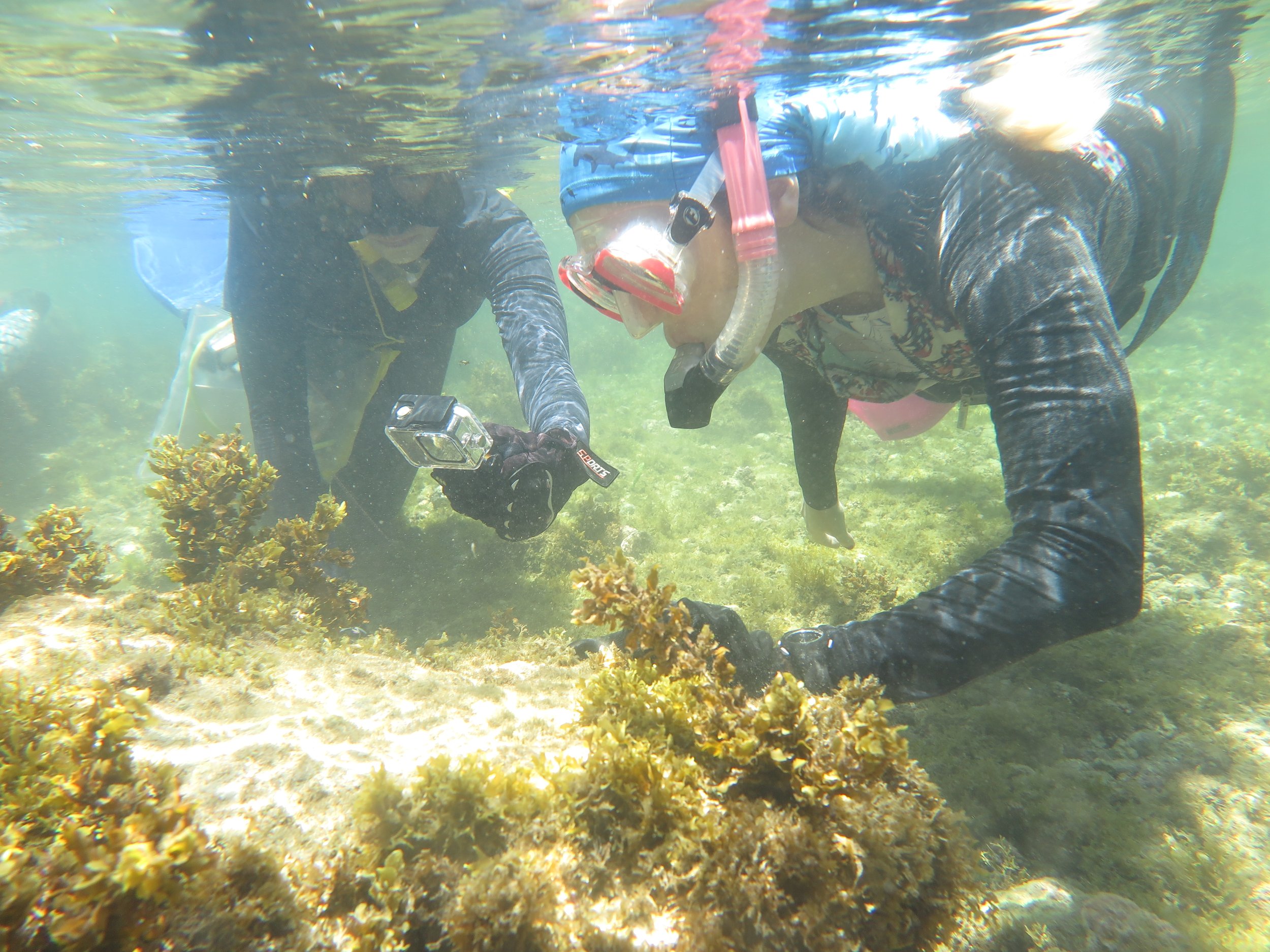
Meet our grantees
Wild Animal Initiative funds academic research on high-priority questions in wild animal welfare.
The goal of our grants program is to fund research that deepens scientific knowledge of the welfare of wild animals in order to better understand how to improve the welfare of as many wild animals as possible, regardless of what causes the threats to their well-being.
We showcase our grantees and their projects here and continuously update this page as new projects are added.
Development of octopus mind in the wild: a behavioral, ecological and evolutionary investigation into sentience and emotional states in Octopus insularis juveniles
Grantee: Michaella Andrade
Institution: Federal University of ABC
Project summary
There is evidence that evolutionary pressures can cause behaviors with opposite meanings to develop opposite forms, the way a frown is the opposite of a smile. One way to understand the expression of emotion in animals may therefore be to identify pairs of behaviors that are opposites. In octopuses, which are increasingly being recognized as sentient, colors can be signals of emotional valence during conflict and other situations. Yet no study has tested whether octopuses have opposite pairs of color signals. This project will produce descriptions of evolutionary and behavioral patterns that reflect the emotional states and sentience of juvenile octopuses, which may contribute to the welfare of octopuses and other invertebrates.
Grantee: Michaella Andrade
Institution: Federal University of ABC, Brazil
Grant amount: $37,959
Grant type: Challenge grants
Focal species: Octopuses (Octopoda sp.)
Conservation status: Data deficient
Disciplines: Sentience, animal behavior
Research location: Brazil
Publications
Andrade M.P., et al. (2023). Assessing Negative Welfare Measures for Wild Invertebrates: The Case for Octopuses. Animals, 13(19), 3021. https://doi.org/10.3390/ani13193021
Project summary
Welfare refers to the quality of life of animals that possess sentient capacity and emotional states. Although the precursors of sentience were possibly present on the planet as early as 890 million years ago, the evolution of sentience is still poorly understood. However, cephalopods are increasingly being recognized as sentient, yet we do not know about this phenomenon in juvenile wild animals. In this sense, studies with wild animals can be beneficial for finding a wider range of ecological triggers and their relationship with behaviors.
There’s evidence that evolutionary pressures can cause behaviors with opposite meanings to eventually develop opposite forms, the way a frown is the opposite of a smile. One way to understand the expression of emotion in animals therefore may be to find pairs of behaviors that are opposites. In octopus, colors can be a signal of emotional valence during conflict and other contexts. Although researchers began to see this dimension in octopuses, no study has tested whether opposite pairs of color signals are present in octopuses. This project will produce descriptions of evolutionary and behavioral patterns that reflect the emotional states and sentience for juvenile octopuses, which may contribute to the welfare of octopuses and other invertebrates.
Why we funded this project
Although octopuses are widely assumed to be sentient at the adult stage, no studies that we are aware of have examined sentience at earlier life stages. As the vast majority of octopuses alive at any one time are juveniles, and octopuses have enormously high juvenile mortality, the question of when in their development sentience arises is particularly important. This project is also interesting because it will teach us about what the lives of juvenile octopuses are like and the extent to which welfare effects are mediated by personality traits.
Photos
The impact of anthropogenic stressors on the affective state of juvenile Murray cod
Grantee: Rafael Freire
Institution: Charles Sturt University
Project summary
Many freshwater fish populations have severely declined as a result of human-caused changes in their environment. Population decline often results from an increased mortality rate experienced on the individual level, with likely implications for the welfare of individuals living through a period of population decline. This study will examine how differences in water quality and the presence of potential predators affect a behavioral indicator of welfare — judgment bias — in juvenile Murray cod (Maccullochella peelii). In the future, data about how juvenile fish respond to these factors could guide interventions for helping juvenile fish survive to adulthood in the wild.
Grantee: Rafael Freire
Institution: Charles Sturt University, Australia
Grant amount: $21,500
Grant type: Challenge grants
Focal species: Murray cod (Maccullochella peelii)
Conservation status: Critically endangered
Disciplines: Animal behavior, sentience, ichthyology
Research location: Australia
Publications
Freire, R. and Nicole, C.J. (2024). A novel method to measure the impact of water quality on judgement bias in wild juvenile fish. Global Ecology and Conservation, 54. https://doi.org/10.1016/j.gecco.2024.e03086
Project summary
Many freshwater fish populations have severely declined as a result of human-caused changes in their environment. Population decline often results from an increased mortality rate experienced on the individual level, with likely implications for the welfare of individuals living through a period of population decline. This study will examine how differences in water quality and the presence of potential predators affect a behavioral indicator of welfare — judgment bias — in juvenile Murray cod (Maccullochella peelii). In the future, data about how juvenile fish respond to these factors could guide interventions for helping juvenile fish survive to adulthood in the wild.
Why we funded this project
The vast majority of wild fish do not survive to adulthood, but little is known about their welfare as juveniles and how that might affect their survival. This project will address that by investigating the effects of multiple aspects of habitat quality on the affective state of juvenile Murray cod. An additional factor in us funding this project was that it would be integrated into ongoing fisheries policy work by the PI, which should ultimately lead to advice for the regional government.






